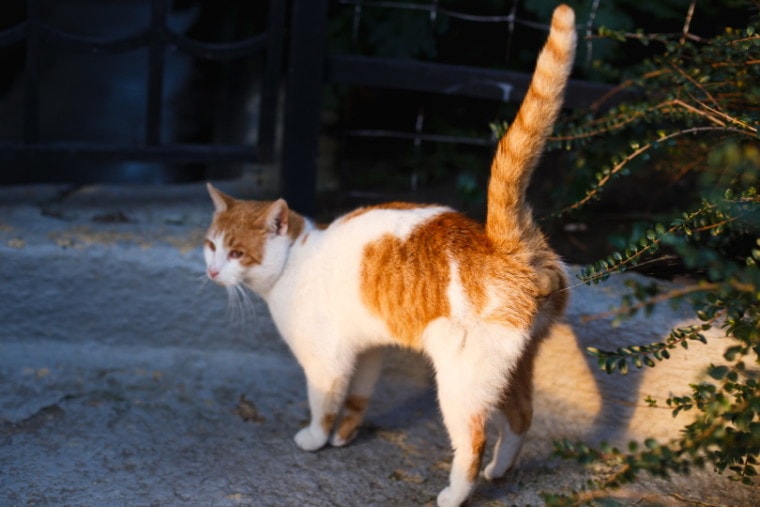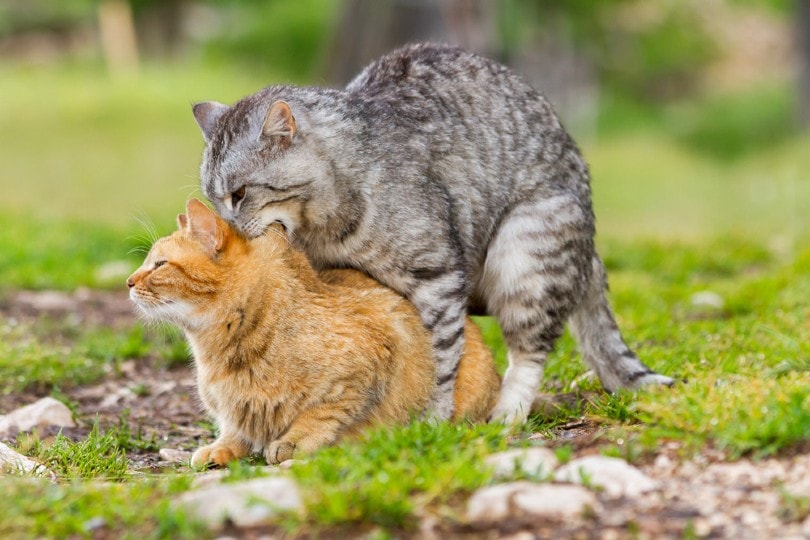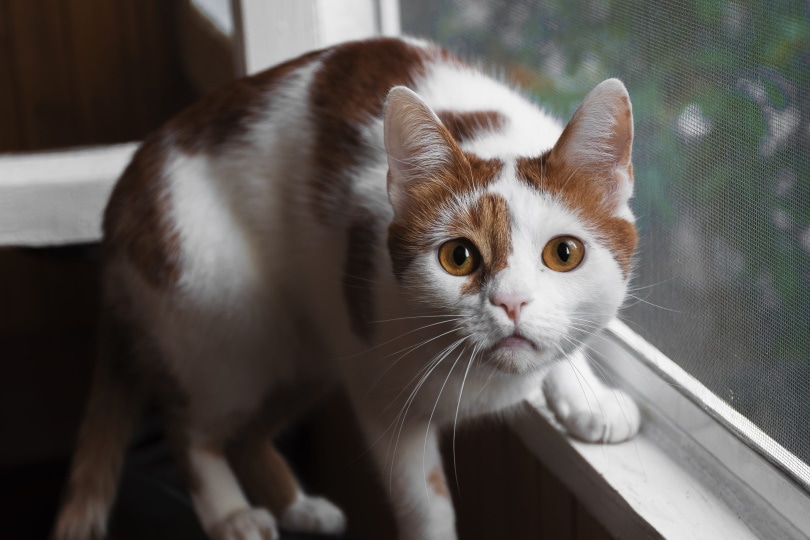
Many cat owners are familiar with the dreaded smell of cat urine lurking on their favorite sweatshirt, blanket, or couch. Spraying should not be confused with inappropriate urination, where the issue is usually an underlying medical problem, stress, or behavioral reasons. Spraying involves intentional passing of a small amount of urine with addition of pheromones on vertical surfaces, such as walls, and is generally a means of marking and communication.
Cats urinate on horizontal surfaces by squatting down and emptying their bladder, while spraying is done standing up, often with quivering of the tail and back legs and onto vertical surfaces, in most cases. While the act of spraying is typically associated with male cats, female cats are also known to exhibit this same behavior when they feel insecure or stressed in their surroundings.
Read on to learn about the most common reasons why your female cat may be spraying. Speak to your vet if your cat has not been spraying before now or if you noticed any changes in their urination, drinking, or eating habits.
The 3 Reasons Female Cats Spray
If your female cat is spraying around your home, she may be showing you that she is feeling some sort of stress in her life, and you are going to have to figure out what is making her feel insecure and anxious. However, if your female cat or kitten is not neutered, spraying may be a normal heat behavior used to attract a mate, but it is generally more common behavior in male cats. Spraying is one of the ways cats communicate particularly when it comes to marking their territory.
Here are the most common reasons female cats spray in the home.
1. Heat Behavior and a Means of Communication
If you have a female cat or a kitten that is not yet neutered, they will go into heat when they reach sexual maturity, which is as early as 4 months or up to 9 months or more, depending on the breed. Cats will be in heat for an average of 7 days, but it may be longer, and the heat cycle repeats after a short break of just a few days to up to 3 weeks until the cat gets pregnant or the breeding season ends.
Female cats in heat may spray around the home and outdoors in order to leave their scent and attract a mate, although spraying is generally more common in male cats, particularly intact ones. Alongside spraying, your female cat will exhibit extra signs of affection and is likely to become quite vocal. Speak to your vet about getting your cat neutered, as this is the only way to prevent the undesirable heat behavior and the unwanted pregnancies contributing to large numbers of abandoned cats and kittens in shelters.
Cats will also spray as a way to communicate with other cats from their household and neighboring cats. This way, they are leaving their mark and establishing their territory to tell the other cats not to come closer. Indoor cats may spray inside if there is a neighboring cat coming to your garden or even entering your home.

2. Stress
There are many ways your cat can become stressed, and although some may sound very obvious, others are actually quite subtle and may be difficult to read. Let’s look into some common causes of stress for your cat.
Change of Routine
Many cats like to have a predictable daily routine, and disruptions in their routine can trigger stress responses. This is more common than you think and can be as simple as getting a new pet, buying new furniture, rearranging things inside the home, having friends come over, or moving houses. Always make small and gradual changes in their routine or environment, and give your cat some time to adjust to the new schedule or situation and she will likely stop spraying once she relaxes.
Changes in the litter box size, location, or litter material may be enough to cause stress to your female cat. No one likes using a dirty toilet, and your cat doesn’t appreciate a filthy litter box either. Try adjusting where the litter box is located to see if a simple location change can solve the problem. Your cat may be shy, and a public toilet could be causing her anxiety issues. If moving the litter box to another area doesn’t help, try replacing the litter and cleaning the box more often to see if that solves the issue.
In anticipation of change, use special cat pheromone diffusers, as they will provide your cat with reassurance and comfort. In some cases where the source of stress is difficult to identify, or the cat is anxious and isn’t improving with the normal routine being re-established, speaking to your vet is crucial, as stress, particularly chronic stress, may lead to many health issues and unwanted behaviors.

Competition for Resources
If you have multiple cats, they can easily get stressed, particularly if they feel threatened by one of the other cats or they feel the need to compete for resources. Many cats prefer a solitary life, while some do very well in a group environment. This usually works best if the cats know each other well or are closely related, such as mother and her kittens or siblings, and if the resources are plentiful.

Unfamiliar cats or introducing a new cat to your household may cause stress to all cats involved, as cats may end up competing for food, toys, resting areas, and other things. Ensuring there is plenty of space, privacy, and resources for each cat, and that all of them get some affectionate me time with you, is one way to ensure all cats are happy and relaxed while living together. Cats may exhibit stress in very subtle ways, such as hiding or eating less rather than being aggressive towards other cats, so the signs may be difficult to read.
Territorial Disputes
Cats are known for being territorial about their space. If you have recently brought home a new cat, your female could be feeling stressed about the addition of a new resident. To help ease this stressor, make sure there are enough resources for each cat in your household, as we have already discussed. This could mean adding additional water and food bowls, litter boxes, cat trees, or sleeping pads and beds. You may need to also use a pheromone spray to help calm the cats as they become used to each other.
Other cats in her domain may also include outdoor cats that might be venturing onto your property. If your female cat can see these cats through the window, she will likely spray if she is startled or upset at the presence of other cats in her neighborhood. The easiest solution for this stressor is to close the blinds and curtains on the windows so your cat no longer sees these strangers in her space. Use a magnetic or microchip cat flap if your cat is allowed outside to prevent other strange cats from coming in.
3. Underlying Medical or Behavioral Issues
Finally, the most important aspect is an underlying medical or behavioral issue that led to your cat spraying. We already explained the difference between spraying and urinating, but sometimes, it can be difficult to tell if the only thing you see is a puddle of urine on the wall, carpet, or floor and you have not seen your cat do it. If your cat has not done this before or they are feeling unwell in any way, it’s imperative to get them checked by your vet as soon as possible.

Urinary issues, kidney disease and even joint pain may cause your cat’s urination habits to change. Be observant of your cat’s routine in order to recognize any early changes. If your cat is urinating more, missing the litter box, or has changes in her appetite and amount of drinking, all of these are fed flags that their health is suffering and that they need to see the vet.
If your vet has given the cat a clear bill of health but they are still spraying and a behavioral issue is suspected, it may be wise to contact a feline behaviorist in order to get to the root of the problem.

Spray Cleanup
If your cat has sprayed in your home, scrub the area where she urinated with an enzymatic deodorizer spray to remove the scent of urine. Some cats will continue to spray in the same spot because the smell is appealing and familiar to them, so removing the scent may help prevent reoccurrence.
Changing things around the spot may help as well; if they start to associate it with their feeding or resting place, they will generally not spray. However, the most important thing is to understand why they are doing it in the first place so you can address the issue appropriately.
Our favorite enzyme cleaner is the Hepper Advanced Bio-Enzyme Pet Stain & Odor Eliminator Spray because it permanently removes even the very worst pet stains and smells you can imagine (and makes clean-up a breeze). They even offer a 100% satisfaction guarantee! Click here to order a bottle and freshen up your home today.
At Pet Keen, we’ve admired Hepper for many years, and decided to take a controlling ownership interest so that we could benefit from the outstanding products of this cool cat company!
Final Thoughts
Female cats spray for a variety of reasons, but the most common are stress and anxiety, disputes with other cats regarding resources and territory, change in their routine, a toilet area not to her liking, heat-related behaviors if they are not fixed, or underlying health issues. If you have removed or minimized these stressors and she continues to spray, or if your cat is showing any changes in her urination, eating, and drinking habits, it’s important to get her checked by a vet. Your vet will be able to rule out an underlying health problem or treat it appropriately if there is a condition leading to your cat spraying.
If your female cat is not neutered and is spraying during heat, spaying her should resolve this issue. Hopefully addressing these common reasons for spraying will help you figure out why your female is spraying in order to make them feel more comfortable and relaxed, depending on the underlying cause.
Featured Image Credit: Sergey Zaykov, Shutterstock









